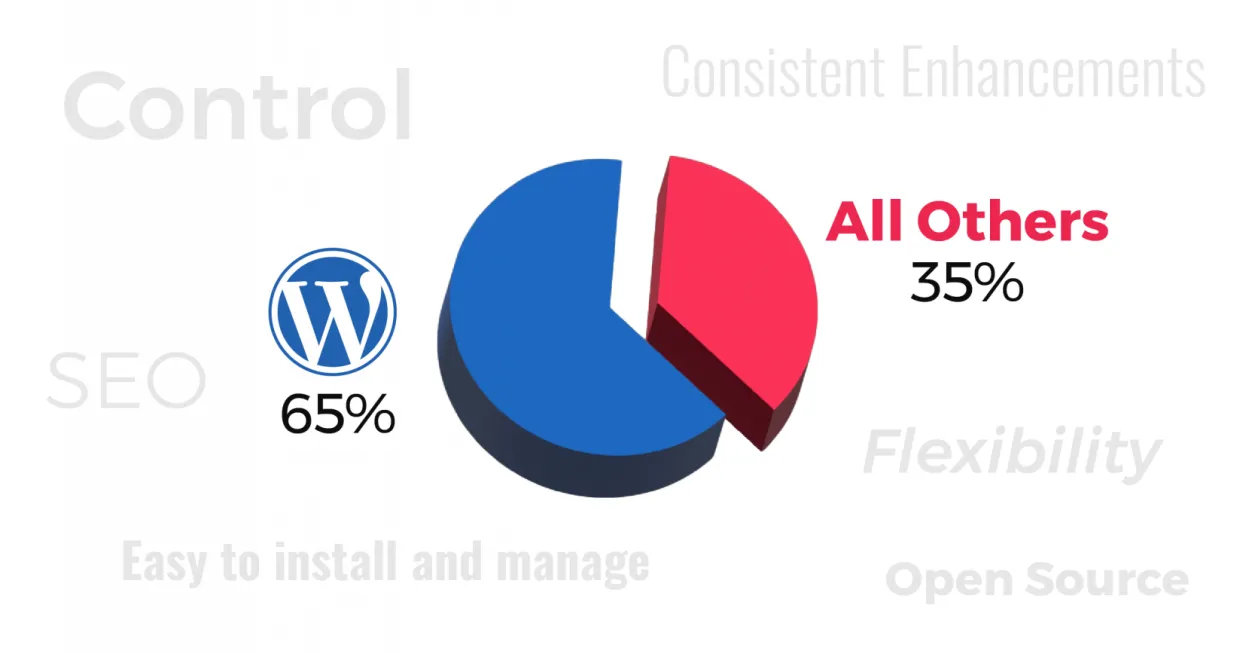Why is WordPress So Popular?

WordPress has been on a steady and steep growth trajectory since its introduction in 2003 as a blogging platform. Latest stats indicate that WordPress powers more than 40 percent of all websites, with a 65 percent share of the CMS market.
That’s more than all other CMS platforms combined.
A lot of other web software platforms have entered the scene over the past 20 years. Some have disappeared and others have carved out a distinct niche. WordPress has evolved into the web software platform that’s as equally well suited for enterprise applications as it is for small business sites and hobbyists.
So, the question is, what is the WordPress special sauce?
Why WordPress? 5 Solid Reasons
From personal users and hobbyists in search of simplicity to enterprise-level users that require high degrees of scalability and specialization, WordPress is gaining ground as the CMS of choice. The popularity of WordPress is a function of many factors that have converged in an alignment with a wide swath of market needs.
Here are the features that I view as the top 5:
1. Control Over SEO
In my experience, Search Engine Optimization is the primary reason these days why websites are migrating to WordPress. WordPress provides for a high degree of control over SEO, due to the ability to leverage a range of SEO plugins that provide site owners with the ability to easily manage their own metadata, including titles, descriptions, keywords, and SEO schema. This is often not the case with proprietary platforms.
In the current environment, a website that does not get noticed by the search engines is at a severe disadvantage, and site owners whose sites are built on do-it-yourself SAAS platforms, are too often discovering that search engines don’t easily find them.
2. Open Source Advantage
As an open-source web software platform, WordPress offers the huge advantage of providing site owners with control over their code base, along with the ability to customize their site to fit their specific needs. The question of where to host the site is also an option that can be determined based on evolving needs and evolving expectations.
Sites that are powered by proprietary software, on the other hand, find themselves locked into steep licensing fees and a level of service that is not guaranteed to remain satisfactory.
Another critical open-source advantage is the fact that WordPress is consistently being enhanced and monitored by millions of users worldwide who have a stake in ensuring the integrity of the platform.
Read: WordPress vs. Drupal: Which CMS is for You?
3. Design Flexibility
Flexibility and control is at the crux of WordPress popularity, and that applies to design as it does SEO. WordPress offers a wide array of themes from which to choose. Site owners have the ability to control the look and feel of the website prior to launch, as well as the ability to revise layouts once it’s live.
4. Security
As can be expected, the prevalence of WordPress sites translates into the possibility of attacks on several fronts. The fact that the software is open source, however, means that hundreds of thousands of users are paying close attention and have a strong investment in the integrity of the platform. As such, security threats are diligently responded to with patches.
5. Evolving, Enterprise Capable Platform
WordPress’s roots as a blogging platform have left a lingering sense in some circles that it is not suited for enterprise-level applications. That myth can quickly be dispelled by a short list of a few highly trafficked and highly visible websites that currently are on WordPress.
Among them:
- Rolling Stone,
- Sony Music,
- TechCrunch,
- Time Magazine,
- CNN Press Room,
- Zillow, and
- BBC America.
What's New and Next for WordPress?
Over the past few years, a number of excellent WordPress page-builder plugins such as Elementor, Divi, and WP Bakery have been introduced.
Gutenberg
Moving forward, the future for WordPress is the block-based Gutenberg editor introduced in WordPress 5. Gutenberg replaces the classic WordPress editor, built on TinyMCE, and presents a significant change for content creation – allowing for the addition of multiple media types and the arrangement of layouts within the editor using blocks.
As a built-in component of WordPress core, Gutenberg allows for much more lightweight and faster websites.
When Gutenberg first hit the market, it was very much in its infancy. Initial feedback accelerated Gutenberg’s growth to the point that it is now very strong and capable, allowing for sites to run faster due to the removal of plug-ins which had weighed down sites.
WordPress hosting platforms such as WP Engine and WordPress VIP are also enhancing caching mechanisms that serve to improve site speed.
Headless WordPress
Another significant development: Headless WordPress, which has been made possible due to the REST API. Headless WordPress leverages WordPress as the CMS, and a different system, such as React, can be used for the front end. Some of the major WordPress hosting companies, such as WP Engine, have headless hosting capabilities, which is a very new development that’s being deployed at the enterprise level.
For more on the future of WordPress, check out the following sites:
Having joined Drupal as an enterprise-level CMS, WordPress and Drupal both offer a distinct set of strengths. Drupal has a very strong programmatic system behind it, and both can serve as equally good options for a wide majority of applications.
Working closely with clients to determine the solutions that stand to best suit their needs, both now and well into the future is what we do at Promet Source. Do you have a specific question or objective that can benefit from expert consultation? Contact us today.
Other Insights & Resources you may like
Get our newsletter
Get weekly Drupal and AI technology advancement news, pro tips, ideas, insights, and more.





